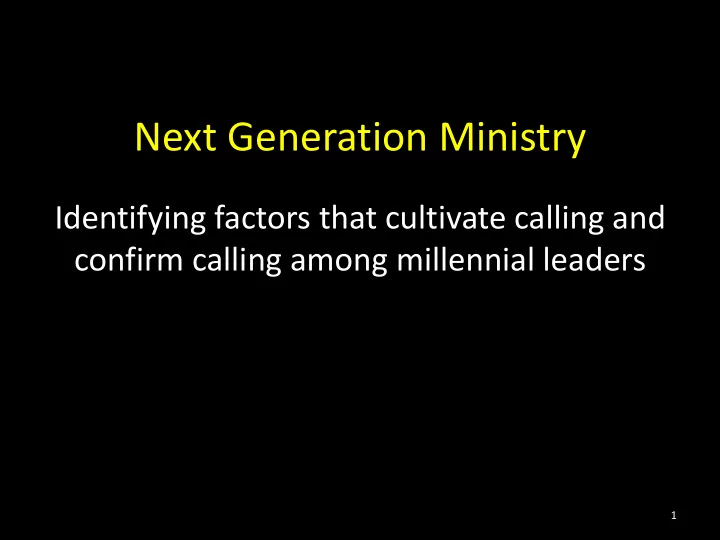

Next Generation Ministry Identifying factors that cultivate calling and confirm calling among millennial leaders 1
Table introductions Spend 15 minutes around tables sharing: • Your name & where you serve • Stories of coming to ministry (pathway to ministry, major factors in feeling called) • Stories of experience in ministry (most fulfilling / most challenging aspects) 2
Focus of project Intersection of three distinct areas of interest: 1. Generational dynamics 2. Biblical concept of calling 3. Experience of pastoral ministry 3
Generational Dynamics 4 https://www.youtube.com/watch?v=5MC2X-LRbkE&t=2s
Generational Dynamics Tim Elmore: “The rapid changes in American society over the past century have contributed to the diverse perspectives of the four generational cohorts represented in the workplace today.” - Responses to authority figures - Responses to technology - Responses to career 5
Generational Dynamics Millennial characteristics: Special Growth & advancement Sheltered Leadership & authority Collaborative Tech & communication Connected Compensation & benefits Work/Life balance 6
Scope of project - Franconia Mennonite Conference of MCUSA • Denominational shortage of young leaders • FMC a higher percentage of millennial pastors 7
Percentage of Millennial Leaders By Conference Central Plains – 13.6% Central District – 6.25% Illinois – 12.0% Mountain States – 6.25% Franconia – 11.3% Indiana-Michigan – 5.5% Ohio – 10% Eastern District – 5.5% Lancaster – 9.1% Atlantic Coast – 2.7% Allegheny – 7.8% Gulf States – 0% New York – 6.9% North Central – 0% 8
Scope of project - Franconia Mennonite Conference of MCUSA • Denominational shortage of young leaders • FMC a higher percentage of millennial pastors What has Franconia Mennonite Conference done well and what lessons can be learned for other conferences and denominations? 9
Approach to project - Qualitative vs Quantitative - Composition of Millennial Group (10 total) • 27-34 years old • 6 males, 4 females • 5 in original position, 5 in subsequent position • 4 lead or solo pastors, 5 children/youth pastor, and 1 conference leadership 10
Approach to project - Qualitative vs Quantitative - Composition of Millennial Group (10 total) • Education: 6 Master of Divinity, 1 currently enrolled in seminary, 3 undergrad degrees • Setting: 5 suburban, 2 rural, 2 urban, 1 mixed • Congregation size: 4 less than 100 members, 2 between 100-250 members, 4 more than 250 members 11
Approach to project - Qualitative vs Quantitative - Composition of Millennial Group - Composition of Control Group 12
Approach to project - Qualitative vs Quantitative - Composition of Millennial Group - Composition of Control Group (10 total) • 41-79 years old • 6 males, 4 females • 1 in original position, 9 in subsequent position • 3 lead or solo pastors, 4 associate pastors, 2 conference leadership, 1 retired 13
Approach to project - Qualitative vs Quantitative - Composition of Millennial Group - Composition of Control Group (10 total) • Education: 2 doctorates, 6 Master of Divinity, 2 undergraduate + some seminary • Setting: 8 suburban, 2 rural, 1 urban • Congregation size: 3 less than 100 members, 3 between 100-250 members, 4 more than 250 members 14
Approach to project - Qualitative vs Quantitative - Composition of Millennial Group - Composition of Control Group 15
Cultivating Calling What leads young people into pastoral ministry? - Pathway to ministry - Sensing God’s call to ministry - Hopes & motivations for pursuing ministry - Expectations regarding ministry - Growth/change as result of being in ministry 16
Confirming Calling What keeps young people in pastoral ministry? - Experience in ministry - Contemplating leaving ministry - Continuing to say “Yes” to ministry - Challenges/opportunities for the Church today 17
18
19
20
21
22
23
24
25
26
27
28
29
Cultivating Calling Confirming Calling - Ministry broadly defined - Stories of transformation - No sense of ministry growing up - Connecting to mission of church - Seminary as ongoing discernment - Exploring new projects - Importance of internships - Relating to people - Opportunities to serve - Weight/burden of role - Sense of spiritual peace - Extent of administration - Overseas experiences - Marriage/family relationships - Fasting/dreams/miraculous - Continue feeling called - Outer calling primary - Seeing impact of ministry - Specific people asking about it - Counselor/spiritual director - Desire for discipleship - Polarization of culture - New ways of experiencing church - Pursuit of comfort/security - Desire for authenticity - Multi-generational issues - Justice-related passions - Missionally-minded ministry 30
Reflections Name 1-2 things in the research you found most interesting/surprising/striking. Name 1-2 questions you have moving forward. Name 1-2 suggestions you have for conferences/churches/pastors seeking to call & retain young leaders. 31
Recommendations - For Conference leaders: pay attention to generational traits - For Churches: develop characteristics of a “calling congregation” - For Pastors: actively and intentionally invite younger persons to consider ministry 32
Recommendations - For Conference leaders: pay attention to generational traits • Special; Sheltered; Collaborative; Connected; Work/Life balance; Growth & Advancement; Leadership & Authority; Technology & Communication; Compensation & Benefits • Assessment of Millennial-Friendly Practices resource 33
Recommendations - For Churches: develop characteristics of a “calling congregation” • PREPARE the congregation; IDENTIFY those gifted for ministry; TEST those who sense/feel called; AFFIRM those who are called; DETERMINE next steps; ENCOURAGE the youth • Characteristics of a Calling Congregation resource 34
Recommendations - For Pastors: actively and intentionally invite younger persons to consider ministry • PREACH on calling to ministry; tell your STORY; FORM a “calling team”; stay ALERT to those with gifts; PRAY; MODEL high regard for pastoral calling • Sermon and Worship Scriptures resource 35
Recommend
More recommend